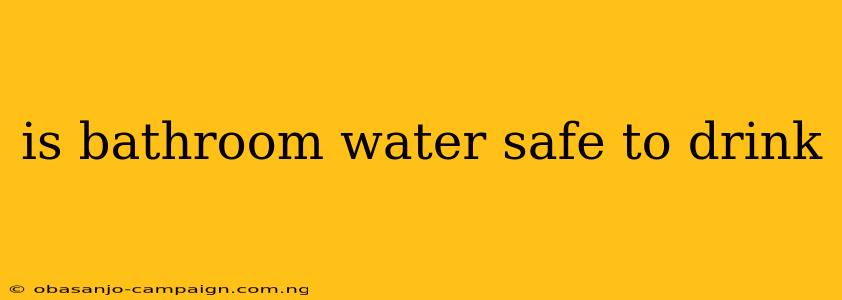The question of whether bathroom water is safe to drink is a common one, especially during emergencies or when faced with a lack of clean drinking water. While it might seem like a viable option in a pinch, the truth is that bathroom water is generally not safe for consumption. This is due to a combination of factors, including potential contamination with bacteria, viruses, and other harmful substances. This article delves into the reasons why bathroom water is unsafe, explores potential risks, and offers alternative solutions for accessing safe drinking water.
Understanding Bathroom Water Contamination
Bathroom water, particularly from sinks and showers, is not intended for drinking. The plumbing system that delivers water to these fixtures is often different from the one that supplies drinking water, and it's susceptible to various contaminants.
1. Bacteria and Viruses
The most significant concern with bathroom water is the potential for bacterial and viral contamination. The water in bathroom plumbing systems can be stagnant, providing an ideal environment for the growth of harmful microorganisms. These microbes can come from various sources, including:
- Toilet Backflow: The toilet's flushing mechanism can create pressure fluctuations in the plumbing system, potentially allowing contaminated water from the toilet bowl to backflow into other fixtures.
- Showerheads: Showerheads can harbor bacteria and mold, especially if they haven't been cleaned regularly.
- Sinks: Sinks, particularly those used for handwashing, can contain bacteria from soap residue and other contaminants.
2. Chemicals and Heavy Metals
Bathroom fixtures can also contribute to chemical contamination. The materials used in plumbing systems, like lead pipes and brass fittings, can leach heavy metals into the water. Additionally, the use of cleaning products in the bathroom can introduce harmful chemicals to the water supply.
3. Sediment and Debris
Bathroom water is often susceptible to sediment buildup, including rust, minerals, and other debris. These particles can be unsightly and potentially harmful if ingested.
When Is Bathroom Water Most Dangerous?
While bathroom water is generally not safe to drink, there are certain circumstances where the risk is heightened:
- After Plumbing Repairs: Following repairs or maintenance on the bathroom plumbing system, there's an increased risk of contamination. It's essential to flush the system thoroughly before using the water for any purpose.
- During Power Outages: When power outages occur, water pressure can drop, leading to backflow and contamination.
- In Older Homes: Homes with older plumbing systems are more prone to lead and other metal leaching, increasing the risk of chemical contamination.
Alternatives to Bathroom Water
If you find yourself without access to clean drinking water, it's crucial to seek alternative sources.
1. Bottled Water
Bottled water is readily available and a reliable source of safe drinking water. However, it's important to choose reputable brands and ensure the bottle is sealed.
2. Water Filters
Portable water filters can effectively remove contaminants like bacteria, viruses, and sediment. Choose filters with a high-quality filtration system, such as those certified by independent testing organizations.
3. Boiling Water
Boiling water for at least one minute can kill most harmful bacteria and viruses. This method is effective when you have access to a stove or campfire.
4. Water Purifiers
Water purifiers use advanced technology to remove contaminants from water. Some purifiers utilize ultraviolet (UV) light, which kills microorganisms.
5. Water Treatment Tablets
Water treatment tablets are convenient and effective for purifying water in the field. These tablets contain chemicals that disinfect water.
Tips for Safe Drinking Water
- Always boil water from unknown sources before drinking.
- Use a water filter or purifier for long-term water treatment.
- Keep your bathroom plumbing system clean and well-maintained.
- Be aware of potential contamination risks during plumbing repairs or power outages.
- If you are unsure about the safety of your water, consult with a local health authority.
Conclusion: Is Bathroom Water Safe to Drink?
In most cases, bathroom water is not safe to drink due to the potential for contamination with bacteria, viruses, chemicals, and other harmful substances. While it might seem tempting to rely on bathroom water in an emergency, it's crucial to prioritize safe drinking water sources. Utilize bottled water, filters, purification methods, or boiling water as alternatives to ensure the safety and well-being of yourself and your family. Always remember to be cautious and prioritize your health when it comes to drinking water.
